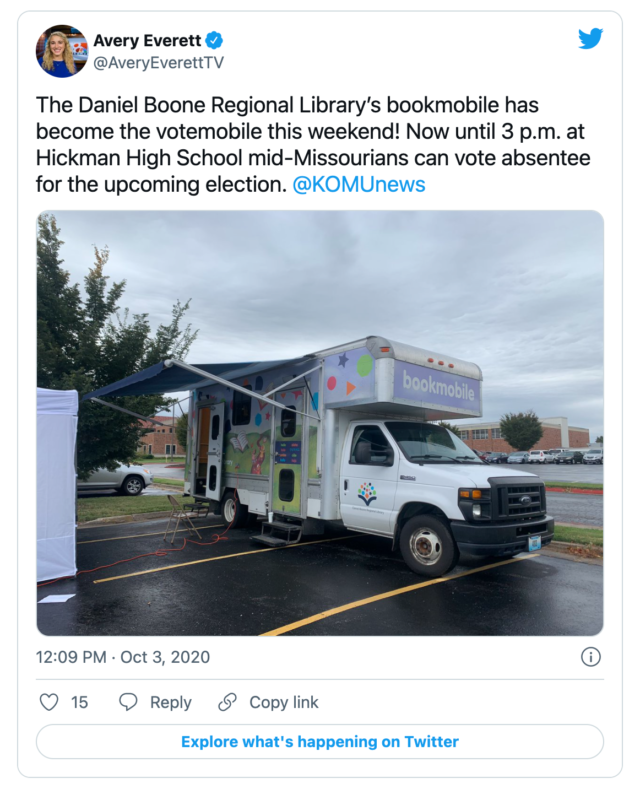14 Ways Election Offices Can Partner with Libraries
This spotlight was featured in our ELECTricity newsletter in March 2022. Sign up to receive more success stories from election offices across the country.
Who doesn’t love libraries? As community hubs and centers of learning, they are natural partners for election offices. Not only are libraries free and nonpartisan, but they are also one of society’s most trusted sources of information. Today we’re highlighting 14 ways that election officials can work with libraries to expand voter registration, education, and engagement efforts. We’ve broken these down into four categories:
- Voter Registration
- In-Person Voting
- Mail/Absentee Voting
- Voter Engagement
Voter Registration
1. Providing Registration Forms. In many states, libraries already offer voter registration services, typically registering voters when they sign up for a library card. But there are a number of other ways that new voters can register at libraries. The Charleston County, South Carolina Board of Elections and Voter Registration partnered with Charleston County Public Library (CCPL) to offer voter registration forms at every library throughout the county. “Libraries are safe, convenient, and accessible community hubs, so this partnership was a natural fit,” says CCPL Executive Director Angela Craig. People can drop their completed forms in secure boxes at several of the library branches.
2. Hosting Registration Drives. Libraries get lots of foot traffic, so hosting a registration drive is a great way to register many new voters at once. Election officials in jurisdictions like Harrison County, Texas and Shawnee County, Kansas have set up tables in their libraries’ lobbies for this purpose. Organizing these events on civic holidays, such as National Voter Registration Day, can help cultivate a sense of community. Rapid City, South Dakota Librarian Carrie Bird planned a registration drive for the holiday in 2021. She explains, “We want to make sure that everybody is taking part in our community, and this seemed like a good way to do that.”
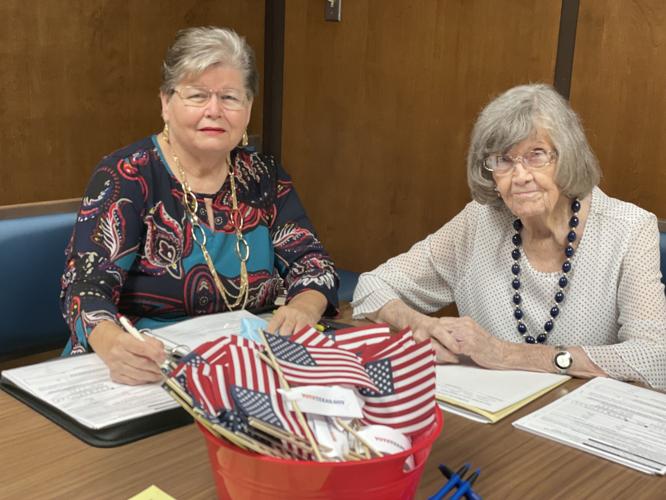
3. Setting Up a Registration Kiosk. The Toledo Lucas County, Ohio Public Library has come up with an innovative solution for voters to check their registration status and make sure they’re prepared to vote. In 2020, they set up a registration “quick-stop” kiosk inside the library. The kiosk is particularly useful for people who have recently moved or changed their name and need to update their registration. It’s also beneficial for those experiencing homelessness, who can use a friend’s or a shelter’s address to register.
In-Person Voting
4. Serving as Voting Sites. Across the country, nearly 500 libraries are used as polling locations for early voting and on Election Day. Since they’re a familiar place, voting at a library can help voters feel welcome and at ease. Paul Kagebein, Adult Services Programmer at the Garland County, Arkansas Library—who has established a partnership with the Garland County Election Commission—says, “Hundreds of people come into the library in a given day just to access other resources. It’s a perfect opportunity for a significant number of people to have an easier opportunity to vote.”
Of course, serving as a polling place also has benefits for the library. At Brooklyn Public Library in New York, librarians pass out library card applications to voters as they wait in line. They also offer coffee and snacks. “It’s a great opportunity to get new users in the door, welcome the community, and keep them coming back,” says Chief Librarian Nick Higgins.
5. Reaching Voters Through BookMobiles. The Thompson Nicola Regional Library in British Columbia has a mobile library, or “BookMobile,” that’s used to serve rural communities without access to libraries. In 2018, they used their BookMobile to serve as a mobile polling place. The program served two purposes: it made it more accessible for rural communities to vote, and promoted the library’s services. Jurisdictions in the U.S. have since implemented similar programs. In Columbia, Missouri, the library’s BookMobile transformed into a VoteMobile for a weekend. And in Austin, Texas, children received free books from the BookMobile, while adults could register to vote and complete the census.
There are now over 1,000 BookMobiles throughout the country, so check with your local library to see if they currently offer this service and how you might be able to form a partnership. Or if your jurisdiction already has a mobile voting unit, you might consider parking it outside the library, like Denver, Colorado did with their cleverly named unit, Haul-N-Votes.
6. Recruiting Librarians as Poll Workers. Because of their commitment to serving the public, librarians are a natural recruitment pool. During the 2020 general election, more than 20 members of the Richland Library team volunteered as poll workers in Richland County, South Carolina. Afterwards, the library published a blog post on its website detailing what the experience was like and encouraging members of the public to volunteer for future elections.
Mail/Absentee Voting
7. Serving as Ballot Drop Box Sites. Libraries are typically centrally located, making them a convenient ballot drop box location for many voters. Jurisdictions like King County, Washington have installed ballot drop boxes at their local libraries. And in 2020, the Madison, Wisconsin Clerk’s office partnered with the public library to convert book drop boxes into ballot drop boxes. It’s a great way for jurisdictions to reduce costs by using existing infrastructure. Just be sure to label the drop box clearly so that voters don’t accidentally put books in the wrong place.
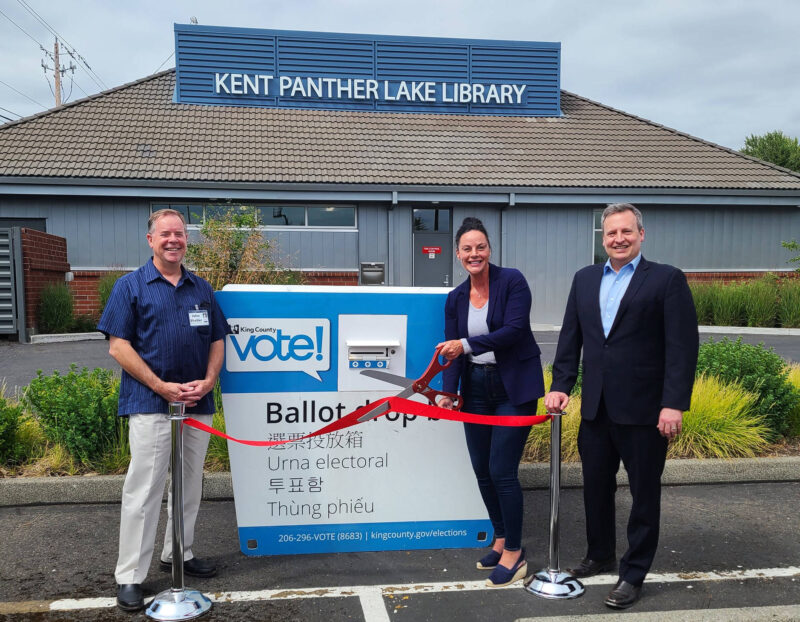
8. Processing Absentee Ballots. In 2020, election offices received record numbers of absentee ballots. In Chesapeake, Virginia, libraries were closed to the public due to the pandemic. Library staff stepped up to help election officials prepare absentee ballot packets, sort ballots, and answer phones. “We absolutely could not have done this without them,” says General Registrar Mary Lynn Pinkerman. And in St. Louis, Missouri, where voters were required to have their absentee ballot notarized, the public library offered free notary services.
Voter Education
9. Hosting Voter Education Events. What better place to educate the public about voting than at the local library? Election officials in jurisdictions like Middlesex County, New Jersey have given lectures at public libraries about the importance of voting. It’s a great way to explain election processes, and answer questions and concerns at the top of voters’ minds.
10. Distributing Voter Guides. If your election office has created voter guides, consider asking your local library to distribute them. Many public libraries also share voter guides on their websites. In Illinois, Skokie Public Library’s Voter Information webpage is an excellent example that helps voters find answers to their most common questions.
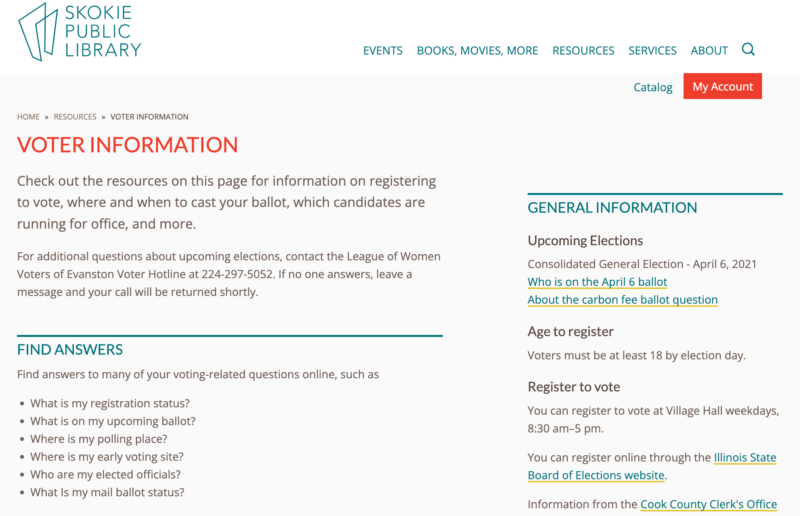
11. Hosting Candidate Forums. Libraries often host in-person and virtual candidate forums so that voters can learn about who is running for office. Election offices can publicize these nonpartisan events on their websites, like Edmonton, Canada does. Or, if possible, they can link to a video of the forum so voters can tune in at any time.
12. Offering Workshops for Prospective Candidates. Not only can libraries help election officials inform voters of their candidates, they can also help them become candidates. The Juneau, Alaska City Clerk’s Office co-sponsored a workshop on how to run for local office with their public library.
13. Organizing Civics Events for Students. School libraries are another potential partner to help election officials engage future voters. Tamara Cox, a high school librarian in Piedmont, South Carolina, partnered with the county election commission to bring in voting machines for students to use in a state book award contest. Tamara says the program was a win-win, allowing the school “to celebrate reading, demystify the voting process, and register eligible voters.”
14. Preserving Election History. Throughout the election season in 2020, two ballot boxes patented in 1884 were on display in the History Department of the Eagle Public Library in Colorado. Employees of the Eagle County Clerk’s Office had discovered the boxes, along with the county’s first Voter Abstract Ledger, while cleaning out their storeroom. Displaying the artifacts in the library gave members of the public a little history lesson, while gently reminding them to cast their own ballots in the General Election.
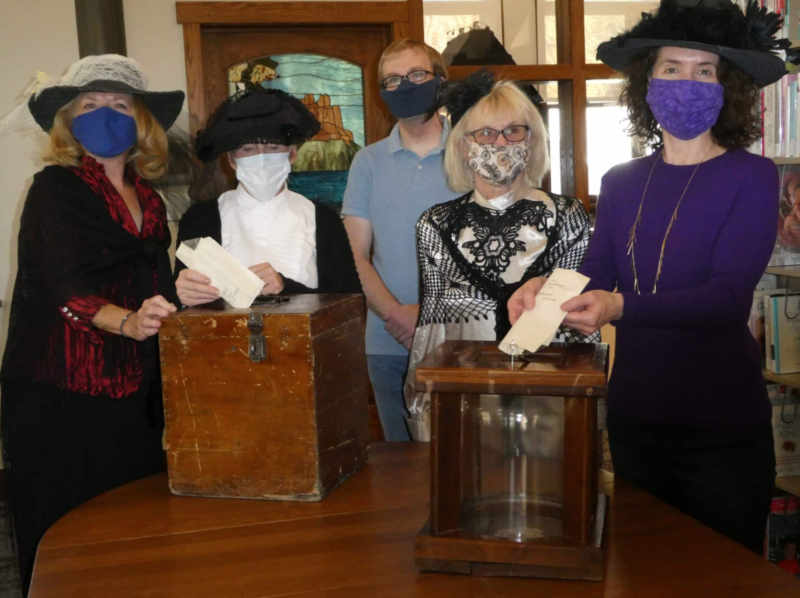
Additional Resources
Sometimes the partnership between election offices and libraries is natural because a jurisdiction’s election official is also a librarian. In Little River, Wisconsin, Amy River is both the Town Clerk and the Director of the Lena Public Library. In 2020, she was a panelist on a webinar about how libraries can support voter turnout. You can watch it here to learn more.
If you’d like to send reading materials to your local library to encourage them to partner with your election office, the American Library Association’s Libraries and Voter Engagement guide is a great resource to share.
